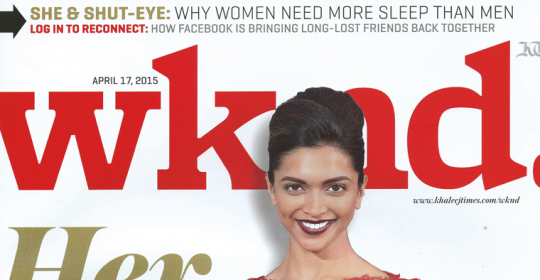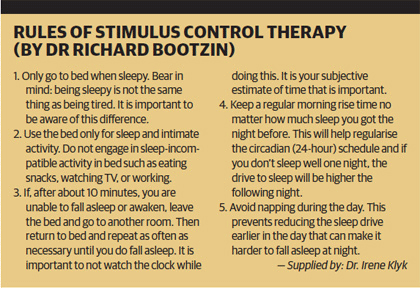
Sleep A to Zzz for Women – Wknd. feat. Dr. Klyk (Neurologist in Dubai)
Sleep Science, Khaleej Times Wknd., Mary Paulose (Chief Sub Editor), Friday, April 17, 2015
 A recent study reinforces the belief that the female of our species needs more shuteye than the male. But in an imperfect world, is that even possible… and necessary? We find out…
A recent study reinforces the belief that the female of our species needs more shuteye than the male. But in an imperfect world, is that even possible… and necessary? We find out…
For starters, who doesn’t like getting a good, long sleep of seven to nine hours every night (or more… )? Medical science and common sense say a good night’s slumber is a key factor to good health and a long life — on par with a balanced diet and regular exercise. Nature ordained that our body (and mind), can only attain an optimum state of rest and rejuvenate itself by suspending our consciousness for these few or more critical hours every night.
But an interesting new study — one that only adds to many other previously reported medical findings — says that women need more sleep than men. While it has been an oft-quoted belief in the medical community, stating this in specific recently is Dr Jim Horne, a leading British expert in sleep science. The National Sleep Foundation (NSF) website states that, on average, women need at least 20 more minutes of sleep than men; Dr Horne also pointed out that women tend to multi-task and use more of their actual brains than men, leading to a greater need for sleep. Essentially, the more you use your brain during the day, the more it needs to rest while asleep.
Several factors that affect women’s sleep include: sleep disturbances during pregnancy, and after childbirth; being woken up and moved around by the partner (as men tend to be larger and toss around in bed more); and, losing sleep from anxiety and worry. Polls conducted by NSF also revealed that women are likelier, than men, to have difficulty falling and staying asleep, and experience more daytime drowsiness.
Such studies can be an eye-opener in more ways than one. For starters, it does show how women’s physiological req-uirements are different from men’s, and hence need to be addressed and treated accordingly. In a more social context, the study even incited some misogynistic comments around us, on how women were just looking for an “excuse to get more shut eye”, and hence “get the men to do more work” (if you figure how that could work, write in to us!).
Local medical opinion, however, seems to agree with the international findings. Dr Irene Klyk, Senior Consultant in Neurology and Psychiatry at the German Neuroscience Center in Dubai, says, “Women do experience more mental and physical consequences from inadequate sleep, such as an increased likelihood of diabetes, depression, anxiety, etc, in the long term. “Sleep is recreational for the body, and the mind. If this recreational process is disturbed for a longer period of time, various physical and mental issues could occur,” states Dr Klyk. “Sleep disorders are one of the most common complaints in the world. Especially in Dubai — with a highly productive work environment — insomnia is a very common complaint and, in our clinic, we see more women with sleep disorders as well.”

There are other — slightly differing — schools of thought. Dr Emad Kowatli, pulmonologist at American Hospital Dubai, says, “It’s a bit difficult to draw a line and state that women need more sleep than men. People’s needs vary, from individual to individual. What’s more important is how they function during the daytime, after a night’s rest.” For instance, if a person functions well enough after just a few hours of sleep, then that’s what their body needs. “People come to my sleep clinic because they’re unhappy about the amount of sleep they’re getting, but I always ask them how they feel and operate the next day.” But women do react differently than men to sleep deprivation; women get more exhausted easily, and they also tend to suffer from insomnia more, Dr Emad states. “More than the amount of sleep, they need better quality of sleep.” Losing a few hours of sleep here and there is alright, but chronic sleep deprivation has severe physiological and psychological effects, Dr Emad warns. “Memory, learning and performance will be affected. Chances of hypertension, strokes, diabetes, lowered immunity, and obesity also increase with regular lack of sleep.”
One thing working women and mothers can do, he advises, is “sleep compensate” on weekends, by adding a few more hours than they get on weekdays.
TO SLEEP OR NOT TO…
Our personal sleep needs vary, and we found out that among women too, the choice of how many hours to sleep is purely personal, and sometimes, adaptable.
Anastasia Mankhaeva is a freelance media producer who writes, does radio talks, covers events and has a packed schedule most days, by her own admission. But, the 31-year-old says, she also trained herself over the years to sleep less and less until she now makes do on just 2-3 hours every night! “I think it’s a myth that we need 7-8 hours or more every night; you can train your body, as I have, not to require than much sleep!” she says. With about six academic degrees under her belt, and her current career as media person and guest lecturer, she has not only reduced her snooze time, but also dependency on things like caffeine and energy drinks to pep her up, she says. “I like to work till way past midnight, as there are no distractions and interruptions at night, go to bed around 2-3am, and wake up around 5-6am, without an alarm,” Anastasia says.
Other factors that contribute to her “sleeplessness”, points out Anastasia, are her vegetarian-only, balanced diet, and napping for about 20 minutes each day, if possible. But her biggest motivation, she says, came from realising how much of our lives we spend in slumber. “Count 7-8 hours every day, in a week, a month, a year — we’re literally sleeping away a third of our lives. I’d rather spend it doing something worthwhile!”
As for needing a certain number of hours’ slumber to remain healthy, she feels “it’s a crowd mentality kind of thing. I’m not disagreeing with the doctors or medical studies, but I’ve had insomnia too, and the trick is to embrace it, and use it to your advantage!”
On the other side of the spectrum is new mum and full-time working professional Richa Nair, for whom sleep is not so much as a necessity, as it is a luxury. “I’m big on sleep: there was a time when I used to love sleeping 8-10 hours a day. But now I’ve made the conscious decision to prioritise: sleep less and spend more time with my 6-month-old baby,” says Richa. “But compared to other new mothers around me, I still get a considerable amount of sleep, I think — about 6-8 hours of mildly interrupted sleep.”
The trick for new mums to get more and better sleep, she says, is to go to bed — and put the baby to sleep — in a relaxed state of mind. “Babies, as they grow, are indeed able to sense your mental state, and if you’re irritated and worried, they actually mirror that and wake up more during the night!” As a working mother who gets home only by 7-8pm and then gets to spend just a couple of hours with her infant, Richa also says she is only happy to wake up along with the baby, 2-3 times every night, as it’s one way of catching up on time spent with him. “So when my baby wakes up, I wake up happy and, in turn, that calms him down and he goes back to sleep in 5-10 minutes tops, which ensures that I get a pretty decent night’s rest as well!”
She is, however, quick to point out that it all depends on each woman and
mother’s domestic situation. “I’m lucky enough to have help around the house, so 6-8 hours sleep is enough for me. It all depends on the kind and amount of
work you do during the day, so I don’t think it’s a gender-related thing at all. My husband probably needs more sleep that I do!” However, bad sleep deprivation does affect her mood. “Tiredness caused from lack of sleep can and does outweigh any happy feelings or consideration I have towards others. I’m indeed a better person with regular hours of sleep,” Richa says.

